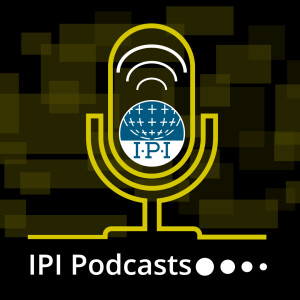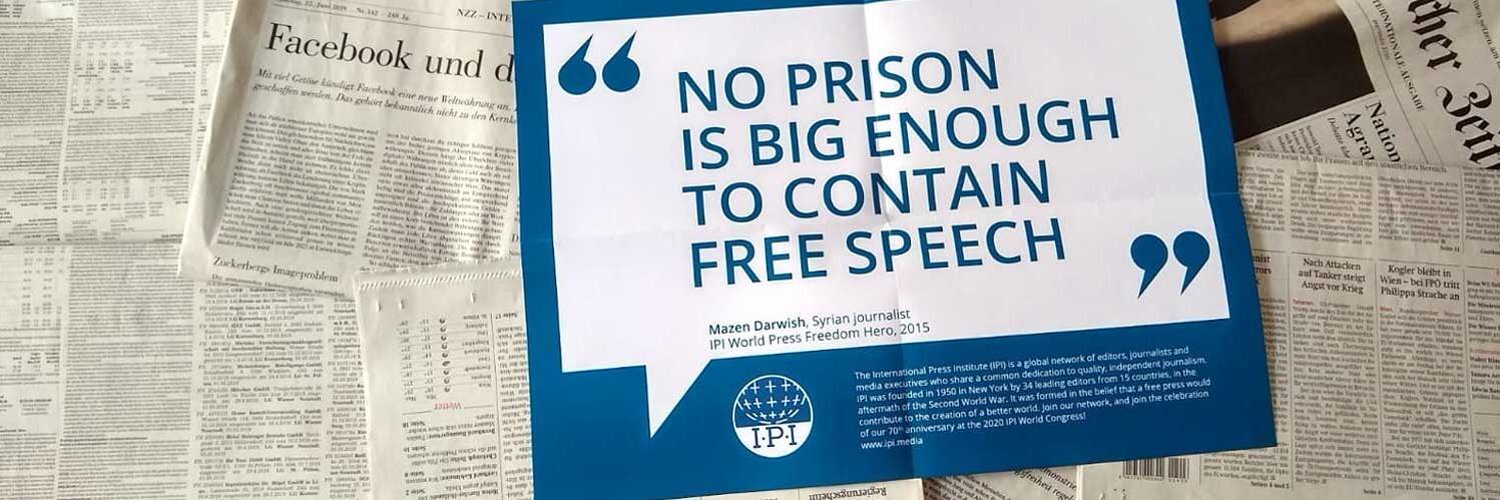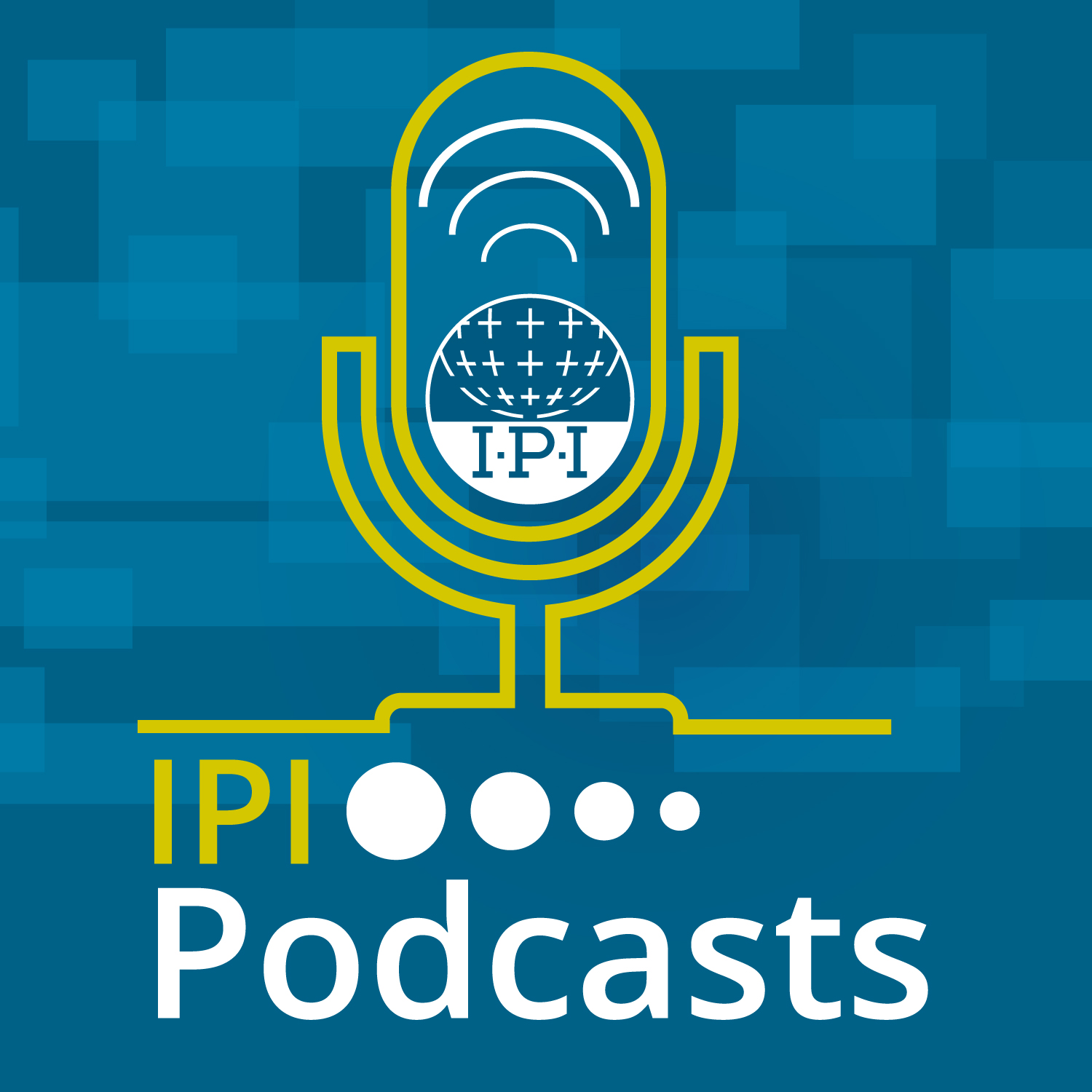Episodes

Wednesday Mar 19, 2025
Medyada İnovasyon 14 | Gülsin Harman - Gazeteci
Wednesday Mar 19, 2025
Wednesday Mar 19, 2025
IPI Medyada İnovasyon serisinin final podcast’i olan 14. bölüm yayında!
Medyada İnovasyon serisinin son bölümünde Uraz Kaspar’ın konuğu gazeteci ve IPI Türkiye Komitesi Başkan Yardımcısı Gülsin Harman oldu.
Bu bölümünde, Gülsin Harman, gazetecilik kariyerini, Uluslararası Basın Enstitüsü (IPI) ile olan ilişkisini ve IPI Türkiye Komitesi'ndeki rolünü anlattı. Ayrıca, medya inovasyonu ve genç gazetecilere yönelik destekler hakkında bilgi verdiği bölümde, haberin formatı ve sunumu, geleneksel ve yeni nesil gazetecilik arasındaki ilişki, içerik üretimi ve gazetecilik tanımı üzerine derinlemesine bir tartışma yapıldı. Gülsin, gazeteciliğin temel ilkelerinin değişmediğini ancak haberin sunum şeklinin değiştiğini vurguladı. Bu bölümde, influencer ve gazetecilik ilişkisi, medya okuryazarlığı, tarafsızlık, etik kaygılar ve inovasyon konuları ele alındı. Ayrıca, medya okuryazarlığının önemi ve gazetecilerin etik sorumlulukları üzerinde duruldu.
Harman’ın bölümde değindiği bazı konu başlıklarını şöyle özetleyebiliriz:
- Uluslararası Basın Enstitüsü (IPI) Hakkında Bilgiler
- IPI Türkiye Ulusal Komitesi, Genç Gazetecilerin Üyelik ve Kazanımları
- Medya İnovasyonu ve Kişisel Deneyimler
- İnovasyon ve Gazetecilik İlişkisi
- Geleneksel ve Yeni Nesil Gazetecilik
- İçerik Üretimi ve Gazetecilik Tanımı
- Influencer ve Gazetecilik İlişkisi
- Medya Okuryazarlığı ve Tarafsızlık
- Gazetecilikte Yenilik ve Etik Kaygılar
- İnovasyon ve Medya İşbirlikleri

Tuesday Feb 11, 2025
Medyada İnovasyon 13 | Selin Uğurtaş - Gazeteci
Tuesday Feb 11, 2025
Tuesday Feb 11, 2025
IPI Medyada İnovasyon podcast serisinin 13. bölümü yayında!
Medyada İnovasyon serisinin yeni bölümünde Uraz Kaspar’ın konuğu iklim gazetecisi ve İklim Masası editörü Selin Uğurtaş oldu.
Bu bölümde, Selin Uğurtaş ile iklim gazeteciliği, Türkiye'deki durumu ve İklim Masası'nın rolü üzerine derinlemesine bir sohbet gerçekleştirdik. Uğurtaş, iklim gazeteciliğinin önemini uluslararası örneklerle karşılaştırarak açıkladı ve bu alandaki inovasyon ihtiyacını vurguladı. Ayrıca, İklim Masası'nın akademik çalışmalar ile medya arasında köprü kurma çabasını ve iklim değişikliğinin toplum üzerindeki etkilerini aktardı. İklim Masası'nın çalışma süreçlerini, iklim gazeteciliği alanındaki farkındalık artırma yöntemlerini ve iklim dezenformasyonuna karşı medya okuryazarlığının önemini ele aldı. Uğurtaş’ın bölümde değindiği bazı konu başlıklarını şöyle özetleyebiliriz:
- İklim gazeteciliğinin medyadaki rolü
- İklim Masası: Medya ve bilim arasında bir köprü
- İklim gazeteciliği: Türkiye ve dünya arasındaki farklar
- İklim haberlerinin toplumun geniş kesimlerine yayılmasının önemi
- İklim haberlerini tüketirken nelere dikkat etmeliyiz?
Uğurtaş’ın yayın sonunda bizlerle paylaştığı kaynaklar ise şunlardır:
- Carbon Brief
- Covering Climate Now
- Climate Change News
- Inside Climate News
- Axios - Energy & Climate
- Grist
Abone olabileceğiniz e-posta bültenleri:

Thursday Jan 30, 2025
Medyada İnovasyon 12 | Hediye Levent - Gazeteci
Thursday Jan 30, 2025
Thursday Jan 30, 2025
IPI Medyada İnovasyon podcast serisinin 12. bölümü yayında!
Medyada İnovasyon serisinin yeni bölümünde Uraz Kaspar’ın konuğu gazeteci Hediye Levent oldu.
Kariyerinde Orta Doğu üzerinde uzmanlaşan Levent, sahada edindiği tecrübeleri ve bu bölgede çalışmak isteyen gazetecilere önerilerini aktardı. Orta Doğu’nun haber ve gazetecilik iklimi, haber masası ile sahadaki muhabirin iletişim ve ilişkisi, bağımsız bir gazeteci olarak sahada bulunmanın artıları ve eksileri gibi konuları ele alan Levent, dil bilmenin sağladığı olumlu katkılara özellikle vurgu yaptı. Levent’in bölümde değindiği bazı konu başlıklarını şöyle özetleyebiliriz:
- Orta Doğu’da bağımsız gazeteci olarak çalışmak
- Sahadan haber yazarken bir YouTube kanalını yönetmek
- Bağımsız bir gazetecinin gelir çeşitliliği ve kurumlarla sahada kurduğu iş ilişkileri
- Değişen ve dönüşen gazeteci kimliği
- Orta Doğu’da çalışmak isteyen genç gazetecilere pratik tavsiyeler ve öneriler

Friday Jan 24, 2025
Medyada İnovasyon 11 | Şükrü Oktay Kılıç - FAYN Kurucusu - Gazeteci
Friday Jan 24, 2025
Friday Jan 24, 2025
IPI Medyada İnovasyon podcast serisinin 11. bölümü yayında!
Medyada İnovasyon serisinin yeni bölümünde Uraz Kaspar’ın konuğu FAYN’ın kurucusu ve gazeteci Şükrü Oktay Kılıç oldu.
Kariyerine dair deneyimlerini paylaşan Kılıç, FAYN'ın yeni medya anlayışı ve gazetecilikteki değişimlerin yanı sıra abonelik modelleri ve okur deneyimi üzerine de önemli bilgiler aktardı. Bu bölümde FAYN'ın haber merkezi işleyişi, finansal destek mekanizmaları, yatırım süreçleri, medya sürdürülebilirliği, reklam ve marka işbirlikleri, yeni medya esnekliği ve FAYN’ın erişimi gibi konular ele alındı. Kılıç’ın medya dünyasındaki rekabeti, yatırımcılarla olan ilişkilerini ve FAYN'ın içerik stratejilerini ayrıntılarıyla paylaştığı bölümde değinilen konu başlıklarından bazılarını şöyle özetleyebiliriz:
- FAYN: Geleneksel ve yaratıcı gazetecilik
- Abonelik modelleri ile yeni medya deneyimi
- Türkiye’de okurlar habere para vermek istiyor mu?
- FAYN'ın haber merkezi işleyişi
- Yatırım süreci ve medya sürdürülebilirliği
- Yeni medya, marka ve reklam ilişkisi
- FAYN’ın benimsediği dosya habercilik mantığının pratikteki işleyişi

Wednesday Jan 22, 2025
Medyada İnovasyon 10 | Ilgaz Fakıoğlu - Scrolli Kurucu Ortağı
Wednesday Jan 22, 2025
Wednesday Jan 22, 2025
IPI Medyada İnovasyon podcast serisinin 10. bölümü yayında!
Medyada İnovasyon serisinin bu bölümünde Uraz Kaspar’ın konuğu Scrolli Kurucu Ortağı Ilgaz Fakıoğlu oldu.
Bu bölümde Kaspar ve Fakıoğlu medya yayıncılığı, inovatif içerik yönetimi ve Türkiye'de medya sektöründeki zorluklar üzerine derinlemesine bir sohbet gerçekleştiriyor. Scrolli'nin inovatif medya modeli, abonelik sistemleri ve kullanıcı etkileşimi gibi konular ele alınıyor. Ayrıca, abonelik modelinin zorlukları, topluluk yönetimi ve haber tüketim alışkanlıkları hakkında da değerlendirmelerin paylaşıldığı bölümde değinilen konu başlıklarından bazılarını şöyle özetleyebiliriz:
- Yeni medya yayıncılığı ve yeni yaklaşımlar
- Yayıncılığın sosyal etki sorumluluğu
- Scrolli: İnovatif Yeni medya modeli
- Türkiye’de abonelik sistemleri ve kullanıcı etkileşimi
- Türkiye'de yeni medya ekosisteminin yaşadığı zorluklar
- Girişimcilik ve medya ekosistemi
Fakıoğlu’nun yayında bahsettiği gazeteler ise şunlardır:

Monday Jan 20, 2025
Medyada İnovasyon 09 | Özlem Akarsu Çelik - Gazeteci
Monday Jan 20, 2025
Monday Jan 20, 2025
IPI Medyada İnovasyon podcast serisinin 9. bölümü yayında!
Medyada İnovasyon serisinin bu bölümünde Uraz Kaspar’ın konuğu gazeteci ve yazar Özlem Akarsu Çelik oldu.
Gazeteci Özlem Akarsu Çelik gazetecilik kariyerine dair deneyimlerini paylaştığı bu bölümde Türkiye'de medyadaki dönüşümünü, alternatif medyaların yükselişini ve yeni medya araçlarının etkilerini ele aldı. Ayrıca, gazetecilik etiği, siyaset gazeteciliği ve yurttaş gazeteciliği konularında önemli noktaları vurguladı. Gazetecilik mesleğinin sorumlulukları, medya dinamiklerindeki değişimleri, genç gazetecilere yönelik mesajlar ve dezenformasyonun etkileri üzerine derinlemesine bir tartışma yaptığımız bölümümüzde Çelik, gazeteciliğin etik boyutlarını ve gerçek bilginin önemini vurguladı.
Çelik’in yayında bahsettiği yazarlar ise şunlardır:

Friday Jan 17, 2025
Medyada İnovasyon 08 | Gökçer Tahincioğlu - Gazeteci
Friday Jan 17, 2025
Friday Jan 17, 2025
IPI Medyada İnovasyon podcast serisinin 8. bölümü yayında!
Medyada İnovasyon serisinin bu bölümünde Uraz Kaspar’ın konuğu gazeteci ve yazar Gökçer Tahincioğlu.
Geleneksel gazetecilik pratiklerinin, medyada yaşanan inovatif değişiklikler sonrası nasıl değiştiği ve dönüştüğünü değerlendirdiğimiz bölümde değinilen konu başlıklarından bazılarını şöyle özetleyebiliriz:
- Medya ve inovasyonun temelleri
- Gazeteci kime denir? Mesleğin tanım ve sınırları
- Habere gitmek: ‘Orada’ olmamanın etkileri
- Yeni medya ve geleneksel gazetecilik arasındaki denge
- Kutuplaşma ve medyanın itibarsızlaşması
- Gazeteciliğin meslek değeri ve zorlukları
- Geleneksel gazetecinin yeni medya ekosistemine adaptasyonu
Tahincioğlu’nun yayında bahsettiği içerikler ise şunlardır:

Thursday Jan 16, 2025
Medyada İnovasyon 07 | Beril Eski - Gazeteci
Thursday Jan 16, 2025
Thursday Jan 16, 2025
IPI Medyada İnovasyon podcast serisinin 7. bölümü yayında!
Medyada İnovasyon serisinin bu bölümünde Uraz Kaspar’ın konuğu Washington Post ve The New York Times (NYT) başta olmak üzere uluslararası medyada haberlere imza atan gazeteci Beril Eski.
Uluslararası bir haber kuruluşunda çalışmanın Türkiye’deki habercilik ortamından farklılaşan yanlarını, NYT’nin Antakya Rönesans Rezidans özel haberini hazırlayan ekipte yer alan Eski ile bu haber dosyası üzerinden değerlendirdik.
Bölümde değinilen konu başlıklarından bazılarını şöyle özetleyebiliriz:
- Uluslararası haber kuruluşlarıyla çalışan gazeteciler için inovasyonun anlamı ve önemi
- İnovasyon ve yaratıcı gazetecilik kavramı
- Reklamcılık ve gazeteciliğin yeni dönemde yakınlaşması
- NYT ve medyadaki inovatif rolü
- Gazetecilerin ekip olarak çalışması ve bunun haber çıktısına katkıları
- Türkiye’deki haber kuruluşlarının inovasyona bakış açıları, eksiklikleri
- Gazetecilerin inovatif araçlara hakimiyetinin ekip içindeki rolü ve önemi
Eski’nin yayında bahsettiği içerikler ise şunlardır:

Wednesday Jan 15, 2025
Wednesday Jan 15, 2025
Medyada İnovasyon serisinin bu bölümünde Uraz Kaspar’ın konuğu TGS Genel Sekreteri ve gazeteci Banu Tuna.
Bu bölümde basın ve medya sektöründeki geleneksel gazeteciliğin dönüşümü, sendikanın ve gazetecilerin bu dönüşüme uyum sağlama süreçlerini konuştuk.
Özellikle yeni medya girişimlerinin değiştirdiği sektör dinamikleri, değişen bu dinamiklerin özellikle mesleğe yeni atılacak olan gazeteci adaylarını nasıl etkileyeceklerini incelediğimiz bölümde değinilen konu başlıklarından bazılarını şöyle özetleyebiliriz:
- TGS medyada yaşanan inovasyona uyum sağlıyor mu?
- Ana akım medya ve sendikacılık
- Türkiye’deki yeni medya kuruluşlarının basın örgütlülüğüne yaklaşımı
- İletişim Fakültesi mezunlarını mezuniyet sonrasında bekleyen koşullar
- Gazeteci kimliğinin benimsenmesi ve iş koşulları

Wednesday Dec 18, 2024
Wednesday Dec 18, 2024
IPI Medyada İnovasyon podcast serisinin 5. bölümü yayında!
Medyada İnovasyon serisinin bu bölümünde Uraz Kaspar’ın konuğu medya girişimcisi ve akademisyen Aykut İbrişim.
Gazetecilerin mesleki inovatif gelişimlerinde yapay zekanın rolünün konuşulduğu bölümde, yapay zeka araçları ve gazeteciler için kullanım şekilleri incelendi. Bölümde üretken yapay zeka desteği ile uluslararası düzeyde bir gazetecilik kariyerine sahip olunabilir mi sorusunun da cevapları arandı.
Bölümde değinilen konu başlıklarından bazılarını şöyle özetleyebiliriz:
- Medyada yapay zekanın yeri ve geleceği
- Üretken yapay zeka ile gazetecilerin iş akışları nasıl değiştirilebilir/geliştirilebilir?
- Gazetecilerin edinecekleri yapay zeka becerilerinin kariyerlerine nasıl bir katkısı olur?
- Gazetecilerin üretken yapay zeka içerik üretim araçlarına yaklaşımı ve kullanımı ile bunun sektöre yansıması
İbrişim’in yayında bahsettiği içerikler ise şunlardır:

